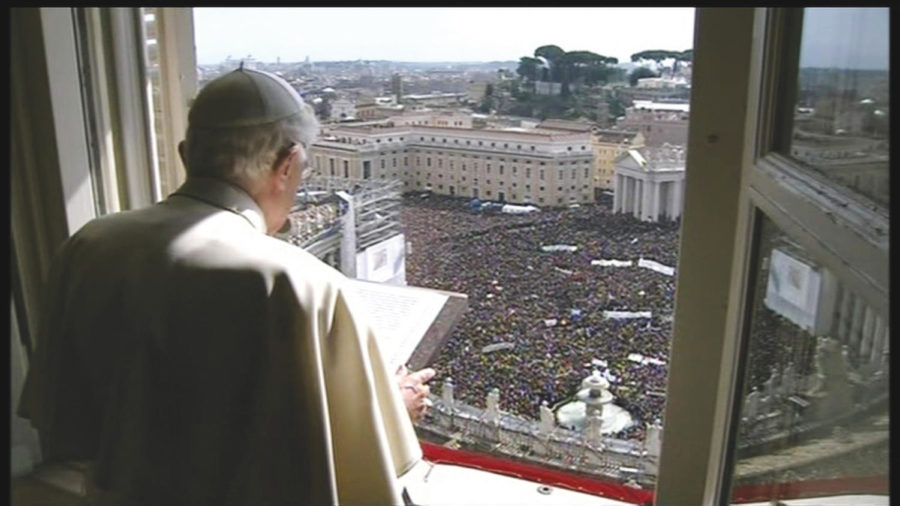Stoffa: Should religious organizations be treated more like corporations?
Pope Benedict XVI delivering his final public blessing on Feb. 24, 2013, to a crowd of thousands at St. Peter’s Square in Vatican City.
February 26, 2013
What did Pope Benedict XVI give up for Lent? The papacy. *rimshot*
Catholic jokes have been rolling for years with a proclivity toward the rather dark-comedy approach to child molestation by priests. With the pope’s resignation, what had been disturbingly joked at has come back into the news.
Due to the often-times confusing “leniency” granted to religious organizations, the ability to create change in the Catholic Church regarding its practices and hiring of priests has not been as progressive as would be expected given the staggering number of abuse allegations made yearly.
And those allegations have only increased with time, likely due to advances in technology, media coverage and general opinion of many people that there is no such thing as infallible, even for religious bodies.
This relates to Pope Benedict’s recent decision to remain in the Vatican possibly with the reasoning that doing so maintains his legal protections against sexual abuse cases across the globe.
“In 2010, for example, Benedict was named as a defendant in a law suit alleging that he failed to take action as a cardinal in 1995 when he was allegedly told about a priest who had abused boys at a U.S. school for the deaf decades earlier. The lawyers withdrew the case last year, and the Vatican said it was a major victory that proved the pope could not be held liable for the actions of abusive priests,” said Philip Pullella in a Reuters article.
Historically, the United States has granted a lot of freedoms to religious/charitable organizations. The number of lawsuits for sexual abuse or other negligent activities would have crippled any other organization or corporation, at the least forcing a massive number of layoffs, restructuring and severing of government financing.
So, the question remains. Why do those permissions continue? Churches are, arguably, the largest corporations on the planet. Their inner-workings rival anything imaginable from such corporate giants as Royal Dutch Oil and the rest of the energy companies or Wal-Mart.
Is the freedom granted to those organizations an idea that has outlived its time?
Religious belief is on the decline worldwide:
“… For 1998 to 2008, atheists grew in 23 of 30 countries for an average gain of 2.3 points. Conversely … certain belief in God declined in 14 of 18 countries from 1991 to 2008 with an average decrease of 2.4 points, and from 1998 to 2008, losses occurred in 24 of 30 countries for a similar average decline of 2.4 points. Likewise … never believing in God rose in 14 of 17 countries from 1991 to 2008 for an average increase of 1.6 points and increased in 20 of 29 countries from 1998 to 2008 by an average gain of 2.2 points,” according to the 2012 study at the University of Chicago,” Belief about God across Time and Countries.”
General trends in the world are not an absolute reason to change a constitutional provision, but the Constitution is a living document subject to reinterpretation and change, given changes in technology and society.
But following rules and regulations in order to receive benefits should not even be a question.
Yet the Catholic Church continues to demand access to public health care subsidies while fighting some requirements it does not agree with: contraceptives for one.
The church does not have a strong history of reprimanding those in its hierarchy that do not report sexual abuse claims to the authorities and even of only relocating suspected priests to new towns instead of delving into the accusations.
Funding those churches comes at great cost. When funds actually come in that might exceed the costs for a particular diocese, those funds tend to be eaten up by paying for lawsuits concerning abuse.
Doesn’t it make sense to alter practices to prevent a crime continually occurring rather than keep shelling out money and sticking to outdated practices?
With those actions in mind, why does the church continue to hold onto tax exemptions and other public funding? Governments are constantly altering practices to fit funding and safety needs. Why should religious allotments not come with the same sort of assistance stipulations?
This isn’t to say religion should not be protected or granted some special permissions. Despite the many wrongs involving representatives of the Catholic Church, it provides positive life assistance, both monetarily and spiritually, to millions around the world.
And this isn’t to say the Catholic Church is the only organization to have rotten apples. All religions have those who do terrible things in the name of their particular close-minded, religious interpretations.
Religions around the world provide hope and assistance to those who follow their teachings and even to some that merely ask for help. Religions around the world are often instruments for good, hampered by the misdeeds of few.
But providing assistance and hope is not enough to be excused from adhering to regulations or being subject to change.
When an organization is receiving public funds and special exemptions and influencing the politics and lives of entire countries, it cannot expect to have its cake and eat it too. The protections for your average Joe are not the same protections to be had for these colossal organizations.
The Catholic Church and all other religious organizations are hardly different than other businesses. They provide services for the people and rely on funds from people — or roundabouts the government from the people — to continue on and prosper.
Nothing is static in the world, and if religious organizations want to continue reaping the benefits of governments in this age of new tolerance, enlightenment and transparency, those organizations must play by the rules based on how they operate and offer up compromise.
——————————————————————————————-







